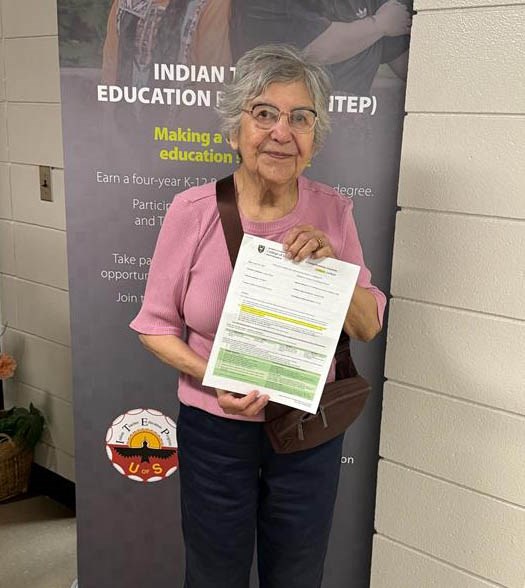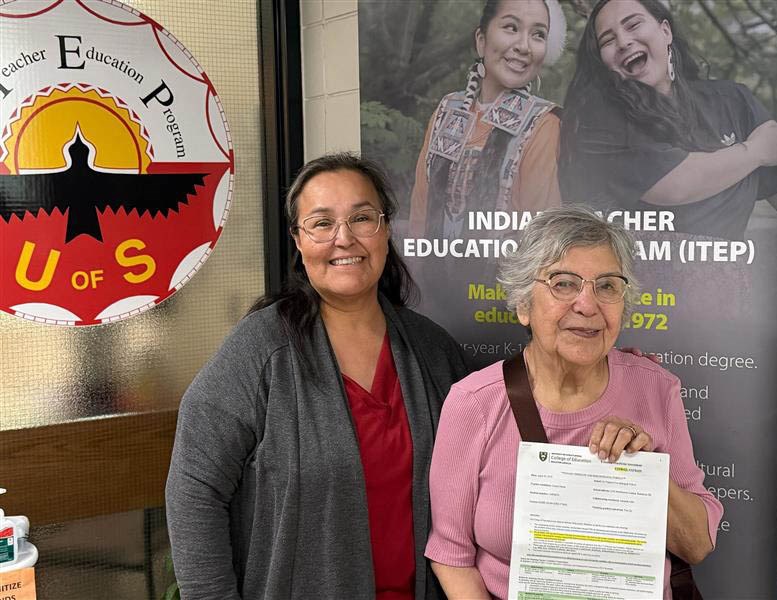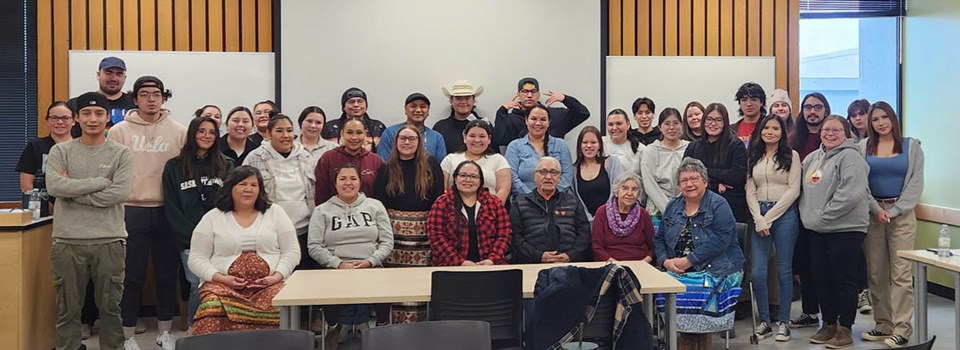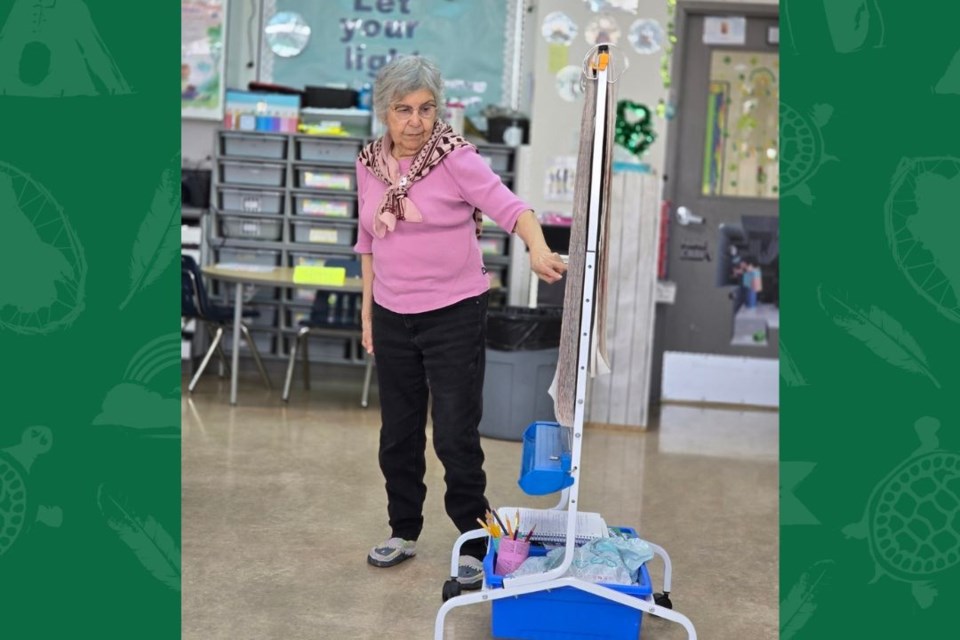SASKATOON — Louise Fraser, a proud member of Mistawasis Nêhiyawak, is proving that age is just a number.
Fraser – whose nēhiyaw (Cree) name wîhkaskwa iskwéw means “Sweetgrass Woman” – has earned numerous degrees, diplomas and certifications throughout her life. Now, with a Bachelor of Education degree from the University of Saskatchewan’s (USask) Indian Teacher Education Program (ITEP), she is pursuing her dream of preserving and teaching the Cree language to children and youth.
“The Cree language – Plains Cree “Y” dialect – was all I heard before I went to residential school,” said Fraser. “Cree was spoken in my home, and that was all I knew. When I went to residential school, I wasn’t allowed to speak my language anymore.”

87-year-old Louise Fraser will be graduating from ITEP this year. | Photo courtesy USask
Fraser was taken away from her family and sent to Indian Residential School in Manitoba around the age of eight. By 12, government policy changes allowed her to attend day school on the reserve, but the damage was done as she had been forcibly assimilated into European ways and the English language. Those formative years had a lasting affect on her sense of identity.
“They made me hate myself because I was an Indian,” she said. “During that time, I didn’t want anything to do with my people. I didn’t want to be living on the reserve, so I made sure I went to high school in Prince Albert.”
Fraser left high school with only a partial Grade 12 diploma. After getting married and raising four children, she decided to return to school.
“I wanted to be a nurse,” said Fraser. “But when I finished high school, I was short some classes or my marks weren’t good enough.”
Though she didn’t complete nursing school, Fraser’s passion for learning led her through a series of jobs and credentials. Over time, Fraser has earned a library technician diploma, a fashion design diploma, and an undergraduate degree and master’s degree in social work. She also completed Indigenous Languages Certificate I and Certificate 2 from First Nations University of Canada, and a Bachelor of Arts from USask.

Louise with ITEP Instructor Mentor Lori-Ann Daniels after completing her extended practicum. | Photo courtesy USask
“My master’s degree was completed from Dalhousie University in 2007,” she said. “I did distance education online for three years. A highlight was attending my convocation in Halifax.”
Married for more than 46 years, Fraser is a mother of four, grandmother of five, and a great-grandmother of four, and has worked across Saskatchewan, including multiple stints in Saskatoon. She also ran her own private mental health therapy practice from 2007 to 2021.
Outside of her work, she has spent her time sewing, listening to music, and visiting libraries and bakeries. Always eager to continue her education, Fraser applied to ITEP in 2023.
“I felt like I wasn’t finished with learning – learning about being a professional,” said Fraser.
Her granddaughter, Kelsey Fraser, graduated from ITEP in 2018 and was excited for her grandmother to follow suit.
“My grandmother proves every day that she can do whatever she wants,” said Kelsey. “Regardless of any stereotypes, ageism or ableism, she’s broken down barriers. I was grateful that she was pursuing ITEP because my own experience was phenomenal. The community that ITEP has is both caring and knowledgeable.”

Louise celebrating her 87th birthday with her ITEP classmates. | Photo courtesy USask
Arlene Bear, associate director of ITEP, recalled meeting with Louise prior to becoming a student.
“What I noticed most about Louise is that she was very authentic and genuine,” said Bear. "She showed a lot of compassion.”
Bear worked with USask departments and the Saskatchewan Professional Teachers Regulatory Board (SPTRB) to determine Fraser’s prior credits. Once the credits were sorted, Fraser was accepted and only needed two years to complete her degree.
ITEP Instructor Mentor Lori-Ann Daniels, who is also from Mistawasis Nêhiyawak, remembers Fraser’s orientation day.
“Louise was really scared and timid,” said Daniels. “But working with her taught me about patience, guidance and acknowledging wisdom. Observing other students in the classroom, some coming out of high school and much younger than her, [they] respected [her] and wanted to connect with her.”
Daniels said Fraser was determined to adapt to new technology and overcome the challenge of returning to school after decades.
“She knew she had the opportunity to make changes for future generations,” said Daniels.
Daniels noticed Fraser slowly overcome her shyness during each student-teaching practicum, by sharing her lived experiences with the K-12 students.
“I could tell she was still nervous during her first [in-school] lesson,” said Daniels. “I had to remind her that this was a learning process, to be patient and acknowledge the feedback.”
“The last time that I went to observe her lesson, the light in her eyes and the way she was comfortable speaking with the students was different. She had come a long way.”
As much as Fraser was learning and growing, she was also leaving a lasting impression on the ITEP community. Bear always enjoyed the office chats with Fraser to share their past experiences.
"I saw growth in her from the beginning to now,” said Bear. “When she shared her stories, I learned more about her education and the language. She’s so wonderful to be with and to work with. I hope when I’m her age, I’m that energetic.”




